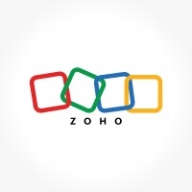

Zoho Analytics and Zendesk compete in the analytics and customer support software market. Zoho Analytics appears favorable in terms of cost-effectiveness and significant feature enhancement, while Zendesk is preferred for its advanced ticket management and integration capabilities.
Features: Zoho Analytics offers web-based graph generation, team collaboration, and extensive reporting including pivot tables and SQL integration. Its dashboard flexibility, API integration, and scheduling capabilities add significant value. Zendesk provides efficient ticket management, integration with business applications, and customizable features that streamline customer support through ticketing, macros, and reporting.
Room for Improvement: Zoho Analytics may improve graphical options, its SQL editor, and navigation interface. User support responsiveness also requires enhancement. Zendesk could enhance ticket merging, reporting capabilities, and intuitive customization options. Its integration flexibility and pricing strategy are noted for improvement.
Ease of Deployment and Customer Service: Zoho Analytics supports deployment across public, private, and hybrid clouds with adaptable technical support, although some users note responsiveness issues. Similarly, Zendesk supports cloud and hybrid environments, receiving general support praise but with room for improved product documentation.
Pricing and ROI: Zoho Analytics is viewed as cost-effective, offering competitive pricing aligned with its features, yielding positive ROI. In contrast, Zendesk's higher pricing impacts budget but is justified by its extensive features and operational efficiency benefits.
I can tell you that we probably saved at least three employees full-time with the ticket management and the automation and the macros and the user follow-up being built in.
I feel that Zendesk helped us set up our platform for providing support way faster than other platforms due to its easy configuration.
We were able to offer a seamless 24/7 support experience and meet all our SLAs due to the robust nature of the platform.
The integration with Zoho People is particularly important because I can access real-time data at any time, including what's happening in the last minute.
After incorporating Zoho Analytics, now all our decisions come from its reviews.
Any time I've integrated customer data using Zoho, I've received great feedback and referrals, and Zoho has gotten me referrals and more customers.
There appears to be a lack of connection between the bot and the agents, making it feel scripted rather than helpful.
The technical support provided by Zendesk has been very satisfactory.
Their support team from Zendesk is excellent, similar to what you have in Freshdesk.
The support team doesn't have full awareness of the system capabilities.
Zoho support provides assistance through live chat to guide us.
If you need help with any issue you face, you can directly call them.
We have not hit a peak or a turn yet that Zendesk has not been able to go with us or been able to grow with us in the process, change or pivot that the company is making.
Zendesk can scale from very small companies to very large ones.
Zendesk's scalability is excellent.
Zoho Analytics can easily adapt to our needs when they grow, and you don't need much knowledge to adapt it; even basic Excel knowledge is sufficient.
You can utilize URL features to redirect users to their records in Zoho CRM or Zoho Desk with just a click.
Zoho Analytics is scalable.
They are always informing us with a status update and an ETA, and the turnaround time is usually within the same day with no extended downtime that would cause a detriment to our company.
Zendesk is quite stable; we experience major outages only once or twice a year, making it very reliable.
The stability has been quite reliable.
A major missing feature compared to Power BI is the ability to create multiple DAX measures or row-level context, which would be useful for showing custom profit and loss statements.
The stability and reliability of Zoho Analytics have been good over time.
The stability and reliability of the product is crucial for optimal performance.
Zendesk could actually support HTML on the tickets so we could format our text better than the current options such as size, bold, italic, or underscored, because the text processing is too simple.
Zendesk is missing an AI aspect that could help provide quick answers based on the knowledge housed within the platform.
Zendesk is amazing, and because they are always working on a new upgrade or a new integration, they are very forward-thinking from an engineering perspective.
The collaborative features of Zoho Analytics have faced one issue: they have tried to reduce the sync time with most Zoho applications, but even with CRM, the sync still takes one hour.
While Power BI uses Power Query, an intuitive and powerful tool that allows data manipulation in any way, Zoho Analytics has limitations.
Having to pay for 25 users when only 11 are needed creates an issue with the pricing structure.
It is not the cheapest solution nor the most expensive, but it provides value for money.
The experience with pricing, setup cost, and licensing for Zendesk was quite expensive.
The annual subscription cost of Zoho Analytics is equivalent to about half of the monthly cost of tools such as Tableau or Power BI.
The pricing for Zoho Analytics is actually cheaper than the competitors for the kind of service they provide.
It allows us to handle more support cases with fewer people due to its advanced artificial intelligence capabilities.
Zendesk is way cheaper than other ITSM platforms such as ServiceNow, providing a good platform at a lower price so we could offer good support with a low budget for the license.
Being able to put response counters on certain tickets and have certain ones that are high priority and have a tighter SLA than lower priority items, being able to categorize them as a question versus an urgent request, and being able to bucket them as feature requests or product enhancements.
The AI called Zia in Zoho Analytics is extremely useful. Whenever I build a chart or dashboard, I can generate a summary of insights using this AI tool, which is very convenient for both leadership and manager level teams to understand the data concepts.
The best feature is that in the same tool, we can use SQL and business intelligence capabilities.
Regarding integration capabilities, I have found Zoho Analytics' 100+ integrations very effective in consolidating data from various sources.
| Product | Market Share (%) |
|---|---|
| Zoho Analytics | 1.4% |
| Zendesk | 0.9% |
| Other | 97.7% |

| Company Size | Count |
|---|---|
| Small Business | 35 |
| Midsize Enterprise | 20 |
| Large Enterprise | 11 |
| Company Size | Count |
|---|---|
| Small Business | 29 |
| Midsize Enterprise | 4 |
| Large Enterprise | 4 |
Zendesk Support is intuitive, and it's built with support agents in mind. Everything they need lives in a single, dynamic help desk interface so it's easy to be productive and manage customer interactions.
Zoho Reports is a powerful, easy-to-use and highly scalable cloud-based reporting and business intelligence platform for small to medium-sized businesses. Its flexible pay-as-you-go pricing model and scope for customization allow businesses to tailor it to their unique needs.
We monitor all Reporting reviews to prevent fraudulent reviews and keep review quality high. We do not post reviews by company employees or direct competitors. We validate each review for authenticity via cross-reference with LinkedIn, and personal follow-up with the reviewer when necessary.